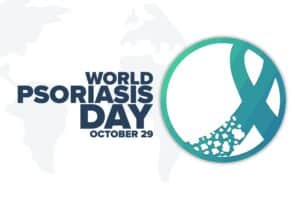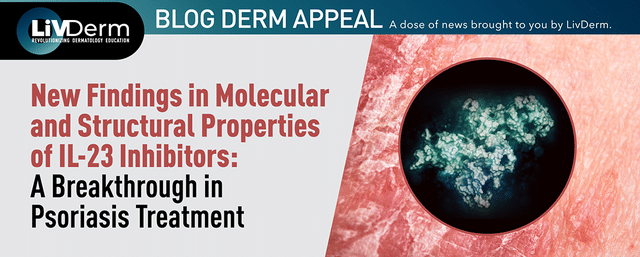World Psoriasis Day is observed each year on October 29th to raise awareness for this chronic autoimmune disease. The theme chosen for this year is United We Tackle Mental Health as a means to recognize the impact of this devastating condition beyond the skin and joints. According to the International Federation of Psoriasis Associations (IFPA), the goal is to unload psoriatic disease by unpacking the causes of mental health complications to start finding solutions.

Psoriasis affects millions worldwide, and research suggests that mental health is increasingly recognized as a significant aspect of living with this condition. Studies show that over a quarter of people living with psoriasis show symptoms of depression. Moreover, psoriatic disease has the highest prevalence of depression compared to other dermatological conditions.
Furthermore, as seen with several other skin conditions, psoriasis can increase the risk of additional clinical conditions such as cardiovascular disease, diabetes, and psoriatic arthritis. These comorbidities add an increased burden to people with psoriatic disease, further impacting their mental health.
A global report which examined psoriatic disease in 4,978 people from 20 countries found that half of the participants reported a moderate-to-very-large impact on their quality of life. Of these, 82% also reported experiencing some form of stigma or discrimination. People living with psoriasis often reported being stared at and excluded from society. They feel a need to cover up and hide their skin or avoid social interaction altogether. This negatively impacts their relationships, work, and social life.
Unfortunately, not all patients are aware of these added comorbidities. In the same global study of 4,978 patients with psoriasis, over 80% were unaware of the increased risk of cardiovascular disease associated with psoriasis. Also, only 29% knew of the connection between psoriasis and psoriatic arthritis.
When questioned about their satisfaction with treatment, 59% stated they had no opportunity to speak with their doctor about what they hoped to achieve with their treatment. Some also mentioned they felt their conditions were not adequately improving on their current treatment.
It is these key findings that help to highlight the gaps not only in the types of treatment available but also in the care provided by practitioners. Recognizing the significant burden that diseases such as psoriasis can have on an individual is a huge step toward finding appropriate treatment.
As health professionals caring for patients with psoriasis, it is hugely beneficial to educate your patients on the disease itself, along with the various comorbidities, treatment options, and mental health impacts. Aside from regular doctor-patient communication, you can also do your part as a practice, providing useful resources and information to help educate patients and their families.
Visit LiVDerm’s Psoriasis Digital Education Hub and Resources page, where you can find a variety of useful educational content.
Also, visit IFPA’s World Psoriasis Day Toolkit, where you can find more information on how to get involved and educate yourself and your patients on psoriatic disease and its impacts.
- International Federation of Psoriasis Associations – World Psoriasis Day 2022 https://ifpa-pso.com/world-psoriasis-day
International Federation of Psoriasis Associations – Inside Psoriatic Disease: Mental Health https://cms.ifpa-pso.com/tools/Mental-Health-Report_eng.pdf
- International Federation of Psoriasis Associations – World Psoriasis Day Toolkit https://cms.ifpa-pso.com/uploads/WPD22-Toolkit.pdf
National Psoriasis Foundation – Psoriasis Statistics https://www.psoriasis.org/psoriasis-statistics/
International Federation of Psoriasis Associations – Psoriasis and Beyond: The Global Psoriatic Disease Survey https://ifpa-pso.com/projects/psoriasis-and-beyond















